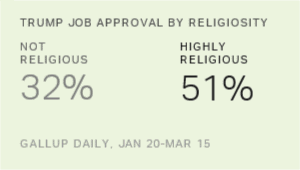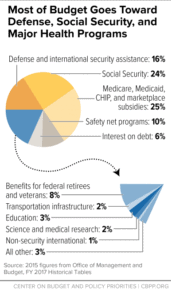Thursday, March 30th, 2017
Jan Lee, Reporter - Policy and Government - triplepundit
Stephan: I had a conversation today with a friend of many years; a psychiatrist who has been a wellbeing oriented social transformation activist for most of his adult life, to considerable success. We found ourselves spending much of our lunch talking about what it is like to watch your country be grievously diminished because a small group of billionaires have been able to buy the government, and a considerable part of the media and impose their fantasies.
We particularly share an interest in science and we also talked about the damage that has been done in the last two months. And it is important to be clear that such damage ripples out into other quarters. This is what I mean.

Credit: triple pundit
American businesses are still trying to figure out how President Donald Trump’s proposed budget could affect their operations. And while it seems increasingly unlikely that Congress will pass Trump’s budget ‘wish list’ as is, the administration’s $1.1 trillion package — which would beef up defense programs, slash funding for other agencies and demand “significant reorganization” of key governmental services — could have dramatic impact on American small businesses.
The Labor Department, which enforces occupational safety and fair employment laws (as well as provides federal funding for unemployment benefits), would lose just over 20 percent of its staff and operational funding. Services like the Senior Community Service Employment Program and the Office of Disability Employment Policy, which facilitate employment opportunities and protections for workers, would be eliminated.
And the Department of Agriculture, whose programs play an indispensable role in ensuring that the towns and rural counties that make up America’s fertile breadbasket have adequate funding infrastructure, would see almost a third of its budget stripped. Key programs that connect mortgage lenders and potential homebuyers would also be cut. […]
1 Comment
Thursday, March 30th, 2017
Frank Newport, Editor in Chief - The Gallup Organization
Stephan: Christianity, at least the largest segment of it, has been willingly seduced by a racist fascist movement. Membership in the political cohort strongly correlates with fundamentalist "Christianity."

Credit: The Gallup Organization
Gallup routinely asks Americans about the importance of religion in their everyday lives, and how often they attend religious services. We have not yet had an opportunity to ask these questions directly to President Donald Trump himself. And we have not asked Americans directly about Trump’s religion. But I suspect that most Americans don’t associate Trump with personal religiousness in the way that they did, for example, President Jimmy Carter.
Trump himself seems quite willing to talk about his religious background. In his speech at the National Prayer Breakfast last month, Trump said, “I was blessed to be raised in a churched home. My mother and father taught me that to whom much is given, much is expected. I was sworn in on the very Bible from which my mother would teach us as young children, and that faith lives on in my heart every single day.”
Trump was raised a Presbyterian in Jamaica, Queens. While growing up, he and his family gravitated toward the Marble Collegiate Church in Manhattan, with its famous […]
2 Comments
Thursday, March 30th, 2017
, - Center on Budget and Policy Priorities
Stephan: THIS IS A CORRECTION.
I made a mistake the other day based on wrong information. I said that Defense took 54% of the budget. You can find this referenced on many media sites. It's wrong. The correct number is 16%. Here is the most recent 2016 accurate information on the budget.
My apologies for the error.
 The federal government collects taxes to finance various public services. As policymakers and citizens weigh key decisions about revenues and expenditures, it is instructive to examine what the government does with the money it collects.
The federal government collects taxes to finance various public services. As policymakers and citizens weigh key decisions about revenues and expenditures, it is instructive to examine what the government does with the money it collects.
In fiscal year 2015, the federal government spent $3.7 trillion, amounting to 21 percent of the nation’s gross domestic product (GDP). Of that $3.7 trillion, over $3.2 trillion was financed by federal revenues. The remaining amount ($438 billion) was financed by borrowing. As the chart below shows, three major areas of spending each make up about one-fifth of the budget:
- Social Security: Last year, 24 percent of the budget, or $888 billion, paid for Social Security, which provided monthly retirement benefits averaging $1,342 to 40 million retired workers in December 2015. Social Security also provided benefits to 2.3 million spouses and children of retired workers, 6.1 million surviving children and spouses of deceased workers, and 10.8 million disabled workers and their eligible dependents in December 2015.
- Medicare, Medicaid, CHIP, and marketplace subsidies: Four health insurance programs — Medicare, Medicaid, the Children’s Health Insurance Program (CHIP), and Affordable […]
3 Comments
Wednesday, March 29th, 2017
Stephan: SR readers know that I have long favored a true cost calculation in making economic policy. When you do that you discover if you do the math all sorts of things we sort of take for granted actually cost society billions of dollars that are never properly accounted for. Here is an example of what I mean, and why I think as I do.

A West Virginia coal mine
Credit: West Virginia Public Broadcasting
The notion of “externalities” has become familiar in environmental circles. It refers to costs imposed by businesses that are not paid for by those businesses. For instance, industrial processes can put pollutants in the air that increase public health costs, but the public, not the polluting businesses, picks up the tab. In this way, businesses privatize profits and publicize costs.
While the notion is incredibly useful, especially in folding ecological concerns into economics, I’ve always had my reservations about it. Environmentalists these days love speaking in the language of economics — it makes them sound Serious — but I worry that wrapping this notion in a bloodless technical term tends to have a narcotizing effect. It brings to mind incrementalism: boost a few taxes here, tighten a regulation there, and the industrial juggernaut can keep right on chugging. However, if we take the idea seriously, not just as an accounting phenomenon but as a deep description of current human practices, its implications are positively revolutionary.
To […]
1 Comment
Wednesday, March 29th, 2017
Josh Harkinson, - Mother Jones
Stephan: From today forward I suggest that you think very carefully before posting any kind of personal information on line. But, as this article lays out, it is more complicated than that. Even the purchases you make, for instance buying some personal product that you would prefer to keep private and personal, can be used to reveal things about you. Have a personal problem on which you sought guidance on online. Grist for the mill., it's now public knowledge. Thanks to Donald Trump that information will now be for sale.
“Consumers should be in control of their own information,” Rep. Jared Polis, (D-Colo.) said in testifying against the bill. “They shouldn’t be forced to sell and give that information to who-knows-who simply for the price of admission for access to the internet.”
The vote overturned rules passed in October by the Federal Communications Commission that tightened limits on what internet service providers (ISPs) could do with their users’ data. The rules, which would have taken effect later this year, required ISPs to notify consumers about the type of information they collect, and obtain their consent, before selling it to third parties. The rules also made ISPs more accountable for preventing data breaches.
The measure was passed […]
2 Comments



 The federal government collects taxes to finance various public services. As policymakers and citizens weigh key decisions about revenues and expenditures, it is instructive to examine what the government does with
The federal government collects taxes to finance various public services. As policymakers and citizens weigh key decisions about revenues and expenditures, it is instructive to examine what the government does with 










